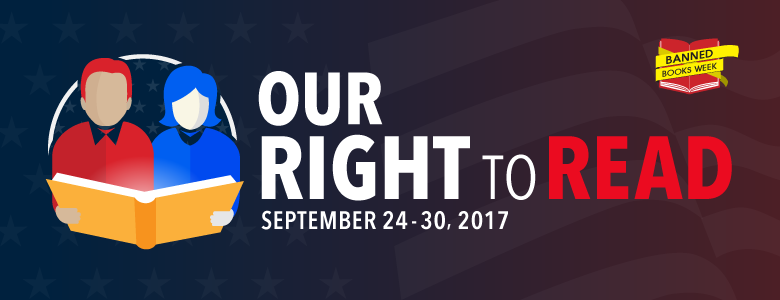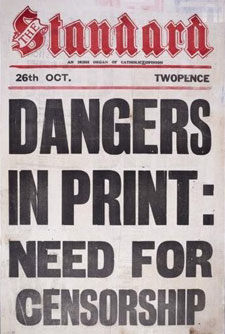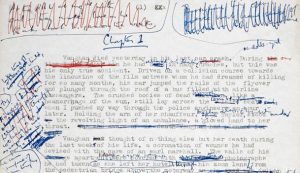7 Aug 2017 | Events
[vc_row][vc_column][vc_column_text]
Join Index on Censorship, Free Word Centre and Islington Library and Heritage Services as we celebrate our freedom to read as part of Banned Books Week.
Every day, across the globe, writers are being censored in a hundred different ways. Some face persecution, others are imprisoned, some have their work banned and some are subject to more insidious means of censorship.
So, who are the modern-day censors? And what ingenious evasions – both modern and ancient – have writers and publishers used to protect our right to read?
Join award-winning journalist David Aaronovitch in conversation with Irish author Claire Hennessy and publisher Lynn Gaspard, as they explore what happens when ideas are silenced.
With readings by Moris Farhi and Bidisha.
The event will be followed by free drinks courtesy of Flying Dog Brewery and Index on Censorship.
Part of Banned Books Week 2017. Presented by Free Word and Index on Censorship in partnership with Islington Library and Heritage Services[/vc_column_text][vc_column_text]Speakers:[/vc_column_text][vc_row_inner][vc_column_inner width=”1/3″][vc_single_image image=”95061″ img_size=”full” alignment=”center”][vc_column_text]David Aaronovitch is an award-winning journalist, broadcaster and author and chair of free expression organisation Index on Censorship. He is a regular columnist for The Times newspaper.[/vc_column_text][/vc_column_inner][vc_column_inner width=”1/3″][vc_single_image image=”95058″ img_size=”200×200″ alignment=”center”][vc_column_text]Claire Hennessy is the Irish author of several young adult novels that boldly tackle many complex issues for young people. She has written about anorexia and, most recently in her new book Like Other Girls, Ireland’s archaic abortion laws and queer culture.[/vc_column_text][/vc_column_inner][vc_column_inner width=”1/3″][vc_single_image image=”95059″ img_size=”200×200″ alignment=”center”][vc_column_text]Lynn Gaspard is the Publisher of Saqi Books, who claim a history rather more dramatic than most bookshops or publishing houses: obstacles over the years have included wars, censorship, political instability and export embargoes.[/vc_column_text][/vc_column_inner][/vc_row_inner][vc_column_text]Readings:[/vc_column_text][vc_row_inner][vc_column_inner width=”1/4″][vc_single_image image=”95062″ img_size=”200×200″ alignment=”center”][/vc_column_inner][vc_column_inner width=”3/4″][vc_column_text]Moris Farhi is a Turkish novelist and essayist who for over twenty-five years has campaigned for writers persecuted and imprisoned by repressive regimes. In 2001 he was elected a Vice President of International PEN. In the same year he was appointed an (MBE) for services to literature.[/vc_column_text][/vc_column_inner][/vc_row_inner][vc_row_inner][vc_column_inner width=”1/4″][vc_single_image image=”95425″ img_size=”200×200″ alignment=”center”][/vc_column_inner][vc_column_inner width=”3/4″][vc_column_text]Bidisha is a British newspaper journalist, critic and broadcaster/presenter for the BBC, Channel 4 and Sky. She specialises in international human rights, social justice, gender and the arts and is a trustee of the Booker Prize Foundation. Her most recent book, Asylum and Exile: Hidden Voices of London, is based on her outreach work, most recently with young asylum seeker mothers[/vc_column_text][/vc_column_inner][/vc_row_inner][/vc_column][/vc_row][vc_row][vc_column][vc_column_text]
[/vc_column_text][/vc_column][/vc_row][vc_row][vc_column][vc_basic_grid post_type=”post” max_items=”4″ element_width=”6″ grid_id=”vc_gid:1504267800522-bc1f7362-e99f-2″ taxonomies=”5844″][/vc_column][/vc_row]
7 Aug 2017 | Events
[vc_row][vc_column][vc_column_text]
Please join us for an event which forms part of Banned Books Week, organised by Index on Censorship. This is a hugely important focus on censorship and the denial of freedom of expression through the banning of books. The event includes the co-authors of a new book – Censored – in conversation with deputy editor of Index on Censorship magazine, Jemimah Steinfeld.
A provocative history of literary censorship uncovers the limits of free speech in the UK and the USA.
When Henry Vizetelly was imprisoned in 1889 for publishing the novels of Émile Zola in English, the problem was not just Zola’s French candour about sex – it was that Vizetelly’s books were cheap, and ordinary people could read them. Censored exposes the role that power plays in censorship.
In twenty-five chapters focusing on a wide range of texts, including the Bible, slave narratives, modernist classics, comic books, and Chicana/o literature, Matthew Fellion and Katherine Inglis chart the forces that have driven censorship for over six hundred years, from fears of civil unrest and corruptible youth to the oppression of various groups – religious and political dissidents, same-sex lovers, the working class, immigrants, women, racialized people, and those who have been incarcerated or enslaved. The authors also consider the weight of speech, and when restraints might be justified. Rich with illustrations that bring to life the personalities and the books that feature in its stories, Censored takes readers behind the scenes into courtroom battles, legislative debates, public campaigns, and private exchanges that have shaped the course of literature.
A vital reminder that the freedom of speech has always been fragile and never enjoyed equally by all, Censored offers lessons from the past to guard against threats to literature in a new political era.
[/vc_column_text][vc_row_inner][vc_column_inner width=”1/3″][vc_single_image image=”95334″ img_size=”full” alignment=”center”][vc_column_text]
As the Norwich’s only truly independent new bookshop, The Book Hive stocks a personally chosen and intriguing selection of titles.
[/vc_column_text][/vc_column_inner][vc_column_inner width=”1/3″][vc_single_image image=”95338″ img_size=”full” alignment=”center”][vc_column_text]
Censored: A Literary History of Subversion & Control
By Matthew Fellion and Katherine Inglis[/vc_column_text][/vc_column_inner][vc_column_inner width=”1/3″][vc_single_image image=”88892″ img_size=”full” alignment=”center”][vc_column_text]Jemimah Steinfeld is the deputy editor of Index on Censorship magazine.[/vc_column_text][/vc_column_inner][/vc_row_inner][/vc_column][/vc_row][vc_row][vc_column][vc_column_text]
When: Wednesday 27 September, 7-8:30pm
Where: The Book Hive, 53 London St, Norwich NR2 1HL
Tickets: Free. More details.
[/vc_column_text][/vc_column][/vc_row][vc_row][vc_column][vc_single_image image=”95224″ img_size=”full” alignment=”center” onclick=”custom_link” link=”https://www.indexoncensorship.org/2017/08/bannedbooksweek-full-slate-events/”][/vc_column][/vc_row]
6 Aug 2017 | Events
[vc_row][vc_column][vc_column_text]
Banned Books Week 2017 is being celebrated with multiple ways to get involved.
[/vc_column_text][vc_custom_heading text=”22 September” font_container=”tag:h3|text_align:left” use_theme_fonts=”yes”][vc_column_text]
When: Friday 22 September, 5pm BST
Where: Archway Methodist Church Archway Close N19 3TD Map
Tickets: £5/£1 under 16s via ArchWay With Words
ArchWay With Words presents a thrilling event with two of Britain’s most exciting, prize-winning writers who tell stories about young people. Alex Wheatle talks about his trilogy of novels set in ‘Crongton’, a place rife with gang warfare and home to a cast of characters whose lives and loyalties are tested in gripping dramas. Patrice Lawrence talks about her dazzling debut ‘Orangeboy’, and the breathtaking follow up ‘Indigo Donut’, a story about tough choices and everyone’s need to belong.
This event is presented by Archway With Words.[/vc_column_text][vc_separator][vc_custom_heading text=”24 September” font_container=”tag:h3|text_align:left” use_theme_fonts=”yes”][vc_column_text]
When: Sunday 24 September 2017, 2-4pm BST
Where: Old Library, Pembroke College, Cambridge Map
Tickets: Free. Registration required via Eventbrite
What is the place of the satirist in our age of controversies? The irreverent cartoonist Martin Rowson, of The Guardian and Index on Censorship magazine, joins publisher Joanna Prior of Penguin Random House for what promises to be a coruscating conversation; feathers will no doubt be ruffled. This event is in association with Pembroke College as part of Banned Books Week and will be introduced by Index CEO Jodie Ginsberg. Full details[/vc_column_text][vc_row_inner equal_height=”yes”][vc_column_inner width=”1/3″][vc_single_image image=”89693″ img_size=”500×300″ alignment=”center”][vc_column_text]
Martin Rowson
[/vc_column_text][/vc_column_inner][vc_column_inner width=”1/3″][vc_single_image image=”95149″ img_size=”500×300″ alignment=”center”][vc_column_text]
Joanna Prior
[/vc_column_text][/vc_column_inner][vc_column_inner width=”1/3″][vc_single_image image=”80210″ img_size=”500×300″ alignment=”center”][vc_column_text]
Jodie Ginsberg
[/vc_column_text][/vc_column_inner][/vc_row_inner][vc_separator][/vc_column][/vc_row][vc_row][vc_column][vc_custom_heading text=”26 September” font_container=”tag:h3|text_align:left” use_theme_fonts=”yes”][vc_column_text]
When: Tuesday 26 September 5-6pm
Where: Online at GoToWebinar
Tickets: Free. Registration required
Over the past few years, the news has been replete with stories about how authors, thought-leaders, and others have become disinvited or pressured to withdraw from university speaking engagements because they don’t promote prevailing ideology. What are the consequences of disallowing diverse viewpoints on campus and what can speakers, faculty, and librarians do to support intellectual freedom in academia?
Join the American Library Association’s Office for Intellectual Freedom, SAGE Publishing and Index on Censorship for a webinar on speaker disinvitation during Banned Books Week. It will include perspectives from Mark Osler, a professor who was disinvited from a campus speaking engagement, Glenn Geher, a professor of psychology who helped to bring a controversial speaker to campus, and Judith C. Russell, a dean of libraries who addresses issues relating to controversial speakers, academic freedom and campus safety on campus.
The event will be chaired by Jemimah Steinfeld, deputy editor of Index on Censorship magazine.
Full details
This event is presented by SAGE Publications[/vc_column_text][vc_row_inner equal_height=”yes”][vc_column_inner width=”1/3″][vc_single_image image=”95734″ img_size=”213×127″ alignment=”center”][vc_column_text]
Mark Osler
[/vc_column_text][/vc_column_inner][vc_column_inner width=”1/3″][vc_single_image image=”95735″ img_size=”213×127″ alignment=”center”][vc_column_text]
Glenn Geher
[/vc_column_text][/vc_column_inner][vc_column_inner width=”1/3″][vc_single_image image=”95736″ img_size=”213×127″ alignment=”center”][vc_column_text]
Judith C. Russell
[/vc_column_text][/vc_column_inner][/vc_row_inner][vc_row_inner equal_height=”yes”][vc_column_inner width=”1/3″][vc_single_image image=”88892″ img_size=”213×127″ alignment=”center”][vc_column_text]
Jemimah Steinfeld
[/vc_column_text][/vc_column_inner][/vc_row_inner][vc_separator][vc_column_text]

British Library
When: Tuesday 26 September 7:15-8:30pm
Where: Knowledge Centre British Library, 96 Euston Rd, Kings Cross, London NW1 2DB
Tickets: From £7 via British Library
Censorship. Whose morals and values does it seek to protect? Trace the blue pencil and its consequences through literary history, from Ulysses and Lolita to a book implicated in a murder case.
For some, such restrictions may seem sensible, while for others, they appear arbitrary at best, oppressive and dangerous at worst. The list of books suppressed in the English language features the sacred and profane, poetic and pornographic, famous and infamous. A history of the censorship of literary texts is also a history of the authorities that have attempted to prevent their circulation: sovereigns, politicians, judges, prison officers, slaveholders, school governors, librarians, teachers, parents, students, editors and publishers.
Katherine Inglis and Matthew Fellion, authors of a fascinating new book on suppressed literature, explore the methods and consequences of censorship and some of the most contentious and fascinating cases. Followed by a book signing. Full details
This event is presented by The British Library[/vc_column_text][vc_separator][/vc_column][/vc_row][vc_row][vc_column][vc_custom_heading text=”27 September” font_container=”tag:h3|text_align:left” use_theme_fonts=”yes”][vc_column_text]
When: Wednesday 27 September 2017, 6:30-8:15pm
Where: Free Word Centre 60 Farringdon Road London EC1R 3GA
Tickets: From £5 via Free Word Centre
Who are the modern-day censors? And what ingenious evasions – both modern and ancient – have writers and publishers used to protect our right to read? Join award-winning journalist David Aaronovitch in conversation with Irish author Claire Hennessy and publisher Lynn Gaspard, as they explore what happens when ideas are silenced. With readings by Moris Farhi and Bidisha. Full details[/vc_column_text][vc_row_inner][vc_column_inner width=”1/3″][vc_single_image image=”95061″ img_size=”200×200″ alignment=”center”][vc_column_text]
David Aaronovitch
[/vc_column_text][/vc_column_inner][vc_column_inner width=”1/3″][vc_single_image image=”95059″ img_size=”200×200″ alignment=”center”][vc_column_text]
Lynn Gaspard
[/vc_column_text][/vc_column_inner][vc_column_inner width=”1/3″][vc_single_image image=”95058″ img_size=”200×200″ alignment=”center”][vc_column_text]
Claire Hennessy
[/vc_column_text][/vc_column_inner][/vc_row_inner][vc_row_inner][vc_column_inner width=”1/3″][vc_single_image image=”95062″ img_size=”200×200″ alignment=”center”][vc_column_text]
Moris Farhi
[/vc_column_text][/vc_column_inner][vc_column_inner width=”1/3″][vc_single_image image=”95425″ img_size=”200×200″ alignment=”center”][vc_column_text]
Bidisha
[/vc_column_text][/vc_column_inner][vc_column_inner width=”1/3″][/vc_column_inner][/vc_row_inner][vc_separator][vc_column_text]
When: Wednesday 27 September, 7-8:30pm
Where: The Book Hive, 53 London St, Norwich NR2 1HL
Tickets: Free. More details.
Join Index on Censorship magazine Deputy Editor Jemimah Steinfeld in conversation with Matthew Fellion and Katherine Inglis, authors of the new book Censored: A Literary History of Subversion and Control.
In twenty-five chapters focusing on a wide range of texts, including the Bible, slave narratives, modernist classics, comic books, and Chicana/o literature, Fellion and Inglis chart the forces that have driven censorship for over six hundred years, from fears of civil unrest and corruptible youth to the oppression of various groups – religious and political dissidents, same-sex lovers, the working class, immigrants, women, racialized people, and those who have been incarcerated or enslaved. The authors also consider the weight of speech, and when restraints might be justified.[/vc_column_text][vc_row_inner][vc_column_inner width=”1/3″][vc_single_image image=”95334″ img_size=”full” alignment=”center”][vc_column_text]The Book Hive is Norwich’s only truly independent new bookshop[/vc_column_text][/vc_column_inner][vc_column_inner width=”1/3″][vc_single_image image=”95338″ img_size=”full” alignment=”center”][vc_column_text]
Censored: A Literary History of Subversion and Control by Matthew Fellion and Katherine Inglis
[/vc_column_text][/vc_column_inner][vc_column_inner width=”1/3″][vc_single_image image=”88892″ img_size=”full” alignment=”center”][vc_column_text]Jemimah Steinfeld, deputy editor Index on Censorship magazine[/vc_column_text][/vc_column_inner][/vc_row_inner][/vc_column][/vc_row][vc_row][vc_column][vc_custom_heading text=”28 September” font_container=”tag:h3|text_align:left” use_theme_fonts=”yes”][vc_column_text]
When: Thursday 28 September 8pm
Where: St Mary’s Cathedral, Bridge St, Limerick, V94 E068, Ireland Map
Tickets: From €8 via Eventbrite
The event is in conjunction with the Kemmy Business School and is a six-part series of public lectures to be delivered by internationally renowned commentators and thought leaders in their field. The third lecture in the series with Jodie Ginsberg will take place on 28 September. Ginsberg will speak about how censorship stifles debate and undermines the tenets of free and democratic societies. Full details[/vc_column_text][vc_row_inner][vc_column_inner width=”1/3″][vc_single_image image=”80210″ img_size=”full” alignment=”center”][vc_column_text]
Jodie Ginsberg
[/vc_column_text][/vc_column_inner][vc_column_inner width=”1/3″][vc_single_image image=”95175″ img_size=”full” alignment=”center”][/vc_column_inner][vc_column_inner width=”1/3″][/vc_column_inner][/vc_row_inner][vc_separator][vc_column_text]
When: Thursday 28 September, 7:00-8:30pm
Where: Knowledge Centre British Library, 96 Euston Rd, Kings Cross, London NW1 2DB
Tickets: From £7 via British Library
“In 1989 the death penalty was re-introduced in Britain. Not for terrorism. Not for murder. But for writing a book.” Nearly 20 years after Salman Rushdie was forced into hiding following the publication of The Satanic Verses, members of the Salman Rushdie Campaign Group re-unite to talk about their fight for freedom of expression. With archive recordings of Salman Rushdie reading from The Satanic Verses. With Lisa Appignanesi, Melvyn Bragg, Frances D’Souza, Sara Khan and Caroline Michel. Full details
Presented by The British Library in partnership with The Royal Society of Literature, Free Word and Islington Library and Heritage Services[/vc_column_text][vc_separator][/vc_column][/vc_row][vc_row][vc_column][vc_custom_heading text=”30 September” font_container=”tag:h3|text_align:left” use_theme_fonts=”yes”][vc_column_text]

British Library
When: Saturday 30 September, 2:30-6pm
Where: Regent Street Cinema 309 Regent Street London W1B 2UW
Tickets: From £16 via British Library
Revisit the shock of symphorophilia with Will Self and Chris Beckett, editor of a new edition of Crash. Their discussion is followed by a rare chance to see the uncut version of David Cronenberg’s 1996 film adaptation on the big screen. Cronenberg’s film of Crash (1996), which Ballard greatly admired, was awarded a Special Jury Prize at its premiere at the Cannes Film Festival. The film introduced a second generation to Ballard’s unsettling vision, and sparked a censorship controversy that led to the film being banned by Westminster City Council. The film will be introduced by its producer, Jeremy Thomas. Full details
This event is presented by The British Library[/vc_column_text][/vc_column][/vc_row]



